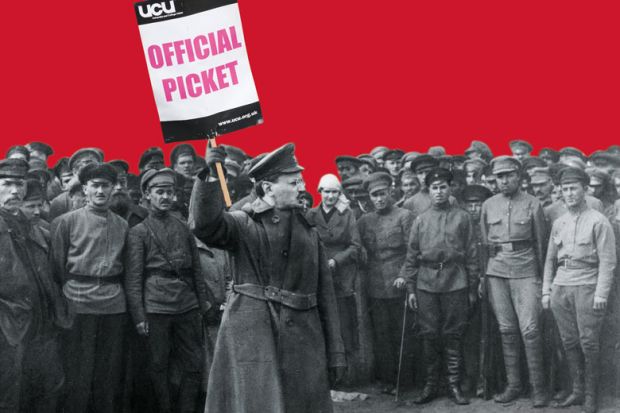Since 2019, the UK’s University and College Union (UCU) has been controlled by a faction, UCU Left. The group presents itself as a body of trade union militants committed to democracy and improved terms and conditions of employment. In fact, it is dominated by members of the Socialist Workers Party (SWP), a revolutionary Trotskyist organisation.
This fact, coupled with the intransigence of the hard-line employers who control Universities UK (UUK) and the Universities and Colleges Employers Association (Ucea), largely explains the roller-coaster ride that UCU members have been on in recent years, with perennial strikes and a marking and assessment boycott last summer that produced no tangible improvements in pay and job security.
Some union members may feel there is no issue here – that UCU Left activists are open about their views and the rest of us are free to disagree. But the SWP members who set up and control UCU Left are generally not open about their politics when standing for election. The UCU Left website makes almost no reference to the SWP, and the UCU Left narrative is a carefully orchestrated exercise in political deception, whose prime purpose is to obscure its Trotskyist provenance and objectives.
According to its website: “UCU Left is committed to building a democratic, accountable campaigning union which aims to mobilise and involve members in defending and improving our pay and conditions and defending progressive principles of education.” These aims appear uncontentious, but it is necessary to delve below the surface, into both the stated aims of the SWP and what these mean in practice for the UCU.
Each week, the SWP’s newspaper, Socialist Worker, articulates the party’s rejection of parliamentary democracy and the capitalist system, which cannot be reformed and must be overthrown in a worldwide struggle for socialism. The working class must therefore be organised into a revolutionary socialist party, to which end a rank-and-file movement must be built within the unions.
This is why the SWP (and other Trotskyists in the UCU) promotes strikes as often as possible: it believes that participation in them – whether they are successful or not – will develop political class consciousness and increase the party’s membership.
These revolutionary aims are, necessarily, rather abstract, so SWP activists have to translate them into specific political practices. These include an elitist assumption that the SWP is a party of far-sighted leaders, responsible for guiding and directing the less enlightened, less active mass of union members. For this reason, the activists believe that collective decision-making by a show of hands at meetings – which they always attend – is superior to all other forms of decision-making, such as online surveys of all members, even when meetings are very poorly attended.
As well as being anti-democratic and elitist, UCU Left’s ideological assumptions are often, if not always, unproven or plain wrong. For instance, SWP activists believe that, at root, workers always want to strike, and will always win if united, but are always betrayed by union “bureaucrats”. On the other hand, they also believe that collective bargaining – the raison d’être of every trade union movement in the world – is an unacceptable “compromise with capitalism”.
When, in late 2022, UCU Left wanted indefinite strikes, for example, it made no effort to build support but simply held a secret factional meeting, agreed the party line, pushed it through the union’s Higher Education Committee and then demanded that the union’s 70,000 higher education members fall into line and implement the resolution.
The result was predictable: consternation among UCU members, and a branch delegates meeting that rejected the proposal by a margin of almost two to one (a vote the SWP militants simply ignored).
This elitist view of union membership is also apparent in a recent UCU Left statement: “We need a new kind of trade unionism where those putting themselves on the line actually take the decisions.” This sounds like a plan to disenfranchise the majority of members in favour of the activist elite – in line with UCU Left’s vote last March against a formal consultation of members on offers made by UUK and Ucea even though an e-survey of 36,000 members indicated a strong wish for this.
The SWP likes to portray anyone who disagrees with its politics as “right wing”, but this is untrue: there is an alternative, and it’s not right wing. It includes rejecting the SWP’s top-down model of leadership, widening membership engagement and boosting membership density from its current level of about 30 per cent of UK university staff.
It also includes taking account of the prevailing balance of power between employers and trade unions, seeking new ways of dividing and putting pressure on employers through identifying weaknesses and vulnerabilities. This way, collective action, including strikes, can be undertaken that, rather than being merely performative, has a good chance of success – perhaps also by making use of Acas, the arbitration service.
Readers may wish to consider these facts when voting in the general secretary and national committee elections. We will be voting for non-UCU Left candidates and for Jo Grady who, whatever her faults, is the only general secretary candidate who has consistently advocated the kind of alternative strategy outlined above.
John Kelly is emeritus professor of industrial relations at Birkbeck, University of London. Adam Ozanne is an honorary senior lecturer in economics at the University of Manchester and a former member of the UCU’s Higher Education Committee. This is a shortened version of a longer article available here.
Register to continue
Why register?
- Registration is free and only takes a moment
- Once registered, you can read 3 articles a month
- Sign up for our newsletter
Subscribe
Or subscribe for unlimited access to:
- Unlimited access to news, views, insights & reviews
- Digital editions
- Digital access to THE’s university and college rankings analysis
Already registered or a current subscriber? Login







